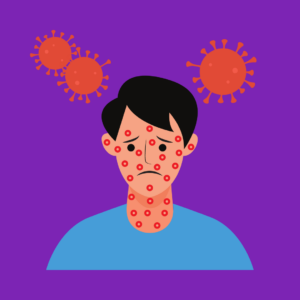Not actually to do with monkeys…
- Monkeypox (MPX) is a virus that first became big news around the world in early 2022, previous to this it was usually only seen in Central and Western Africa.
- The World Health Organisation declared the multi-country outbreak of Monkeypox makes it a Public Health Emergency of International Concern.
- While it isn’t an STI as such, it can be transmitted from person to person by close skin-to-skin contact.
- Most of the cases recently have been acquired during sexual contact. Because of the similarity in the method of transmission, it is important that we talk about it like any other STI.
Is Monkeypox the same as chickenpox?

- No. The monkeypox virus is genetically similar to chickenpox (and likewise, shares a bizarre naming convention that has very little to do with the disease itself).
- While there is a chance you can catch chickenpox merely by being near someone infected (the virus can be transmitted through coughs and sneezes in close proximity- unless you’re vaccinated for chickenpox), then your chances of getting it are pretty low.
- Unlike chickenpox, monkeypox is usually transmitted through direct contact with the fluids and lesions on the skin that the virus causes.
- Being vaccinated for chickenpox offers you no protection against Monkeypox, the monkeypox vaccine is a different vaccine.
- You need the monkeypox vaccine to be protected against monkeypox.
What are the symptoms?
- The symptoms of monkeypox usually appear between 5 days and 3 weeks after infection. The most commonly reported symptoms are sores, bumps, rashes and pimples usually around the genitals, anus, arms or inside of the mouth – so keep an eye out for these!
- You may also experience more common viral symptoms, such as chills, fever, aches and more. You are unlikely to die of monkeypox unless you are already immunocompromised, but it may still be an unpleasant experience.
At the time of writing (Nov 2022), almost all cases of monkey pox have been acquired (got) while travelling overseas, with relatively limited local transmission across Australia. Most cases of monkey pox in NSW were acquired overseas, however there have been a higher number of local transmissions in Victoria. There have been no known local transmissions in Western Australia. To date, almost all cases have been between men who have sex with men who have had multiple partners, hence sex parties and sex on premises venues have led to significantly higher risk of infection.
I’m worried I’m at risk, what do I do?
The best way to protect yourself from monkeypox is to avoid large and/or anonymous sex gatherings, only have sex with people you can readily contact, and of course use protection such as condoms and dams. If you think you may be at risk of getting monkeypox, the good news is that just like chickenpox, there is a vaccination! You should contact your closest public health unit, or organisations such as WAAC, for more information on getting vaccinated. These are also your point of contact if you think you may have been exposed to monkeypox, or are starting to show symptoms, although you can also go to your local GP for diagnosis.

Monkeypox is in WA
Target audience:Young people in Western Australia
Why is everyone talking about Monkeypox?
Target audience:Young people in Western Australia
How can we help prevent Monkeypox?
Target audience:Young people in Western Australia
How do I get my Monkeypox vaccine?
Target audience:Young people in Western Australia